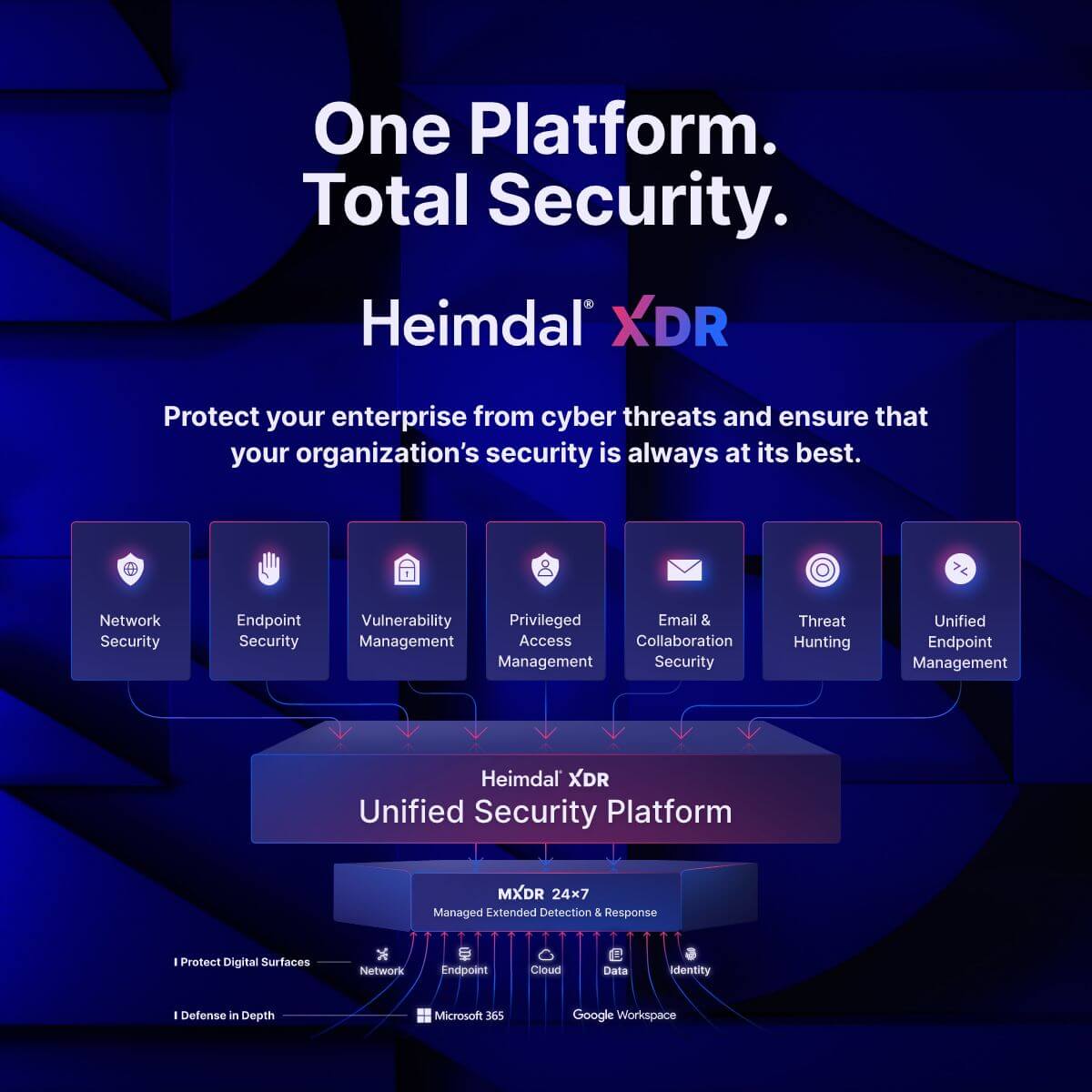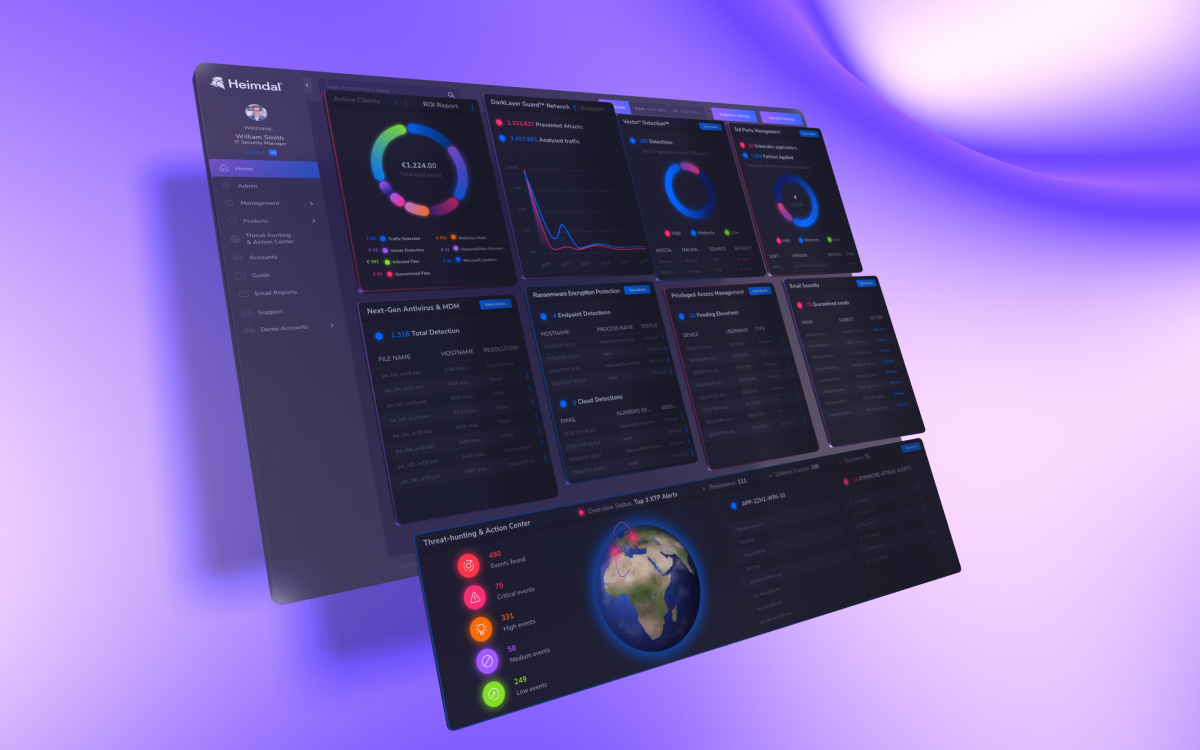Are you considering investing in Microsoft Defender Endpoint Security or ESET Endpoint Security, but you are not sure which one?
Choosing a cybersecurity solution is an important task that can even affect your overall business performance. Don’t worry! Knowing how important is for you to choose the solution that best fits your environment, we are here to guide you.
In this article, we will be comparing Microsoft Defender Endpoint Security and ESET Endpoint Security, analyzing their features, pricing, pros, cons, and more.
But, what if neither solutions are a fit for your environment. To help, we will also be providing you with an alternative solution that offers a comprehensive approach to endpoint security and threat detection.
Microsoft Defender for Endpoint Security
Microsoft Defender for Endpoint integrates seamlessly with the Microsoft ecosystem, offering a comprehensive security solution for businesses that rely on Microsoft 365.
Defender provides multi-layered protection against cyber threats, including malware, ransomware, and phishing attacks, with a strong focus on ease of use and automatic threat remediation.
Microsoft Defender for Endpoint Features
- Seamless Microsoft 365 Integration: Works effortlessly within the Microsoft environment, providing end-to-end security for businesses using Microsoft tools like Azure and Office 365.
- Advanced Threat Protection: Defender’s advanced threat protection (ATP) continuously monitors for vulnerabilities and stops attacks before they cause significant damage.
- Automated Incident Response: The platform automates many security tasks, reducing the need for manual intervention and lightening the workload for IT teams.
- Endpoint Detection and Response (EDR): Delivers comprehensive threat detection and response capabilities, allowing businesses to investigate and remediate attacks quickly.
- Vulnerability Management: Continuously scans and prioritizes vulnerabilities, helping businesses stay ahead of potential risks.
Microsoft Defender for Endpoint Pricing
Defender for Endpoint is either included in the Microsoft 365 E5 plan or available as a standalone product.
For businesses already using Microsoft products, Defender is one of the most cost-effective solutions available.
Its pricing model is especially attractive for small and medium-sized businesses looking for budget-friendly, integrated security solutions.
Microsoft Defender for Endpoint Ease of Use
Defender is particularly user-friendly for businesses already integrated into the Microsoft ecosystem.
Its familiar interface, seamless setup, and minimal learning curve make it easy for companies to deploy security measures without needing advanced technical skills.
The platform’s automatic response capabilities further simplify security management.
Microsoft Defender for Endpoint Pros
- Seamless integration with Microsoft products: Defender fits perfectly within the Microsoft ecosystem, making it an excellent choice for businesses already using Azure, Office 365, or other Microsoft services.
- Comprehensive security at a lower cost: Especially cost-effective for businesses using Microsoft 365 E5, offering a wide array of security tools at a reasonable price.
- Automated threat response: Reduces the workload for IT teams by automating much of the threat detection and remediation processes.
- Real-time monitoring: Provides instant visibility into potential threats and active incidents, allowing for swift response.
Microsoft Defender for Endpoint Cons
- Best suited for Microsoft-centric environments: Defender’s advantages are most noticeable when used within Microsoft environments, limiting its effectiveness for non-Microsoft systems.
- Less advanced detection capabilities than premium competitors: While robust, Defender’s threat detection doesn’t match the advanced AI-based capabilities found in higher-end tools like CrowdStrike.
- Complex for mixed OS environments: Defender isn’t as intuitive in environments that include Linux or macOS devices.
Microsoft Defender for Endpoint Use Cases
Defender for Endpoint is a strong choice for organizations heavily invested in Microsoft products, such as those using Microsoft 365 or Azure.
It’s particularly well-suited for small and medium-sized businesses looking for a fully integrated, cost-effective security solution with minimal complexity.
ESET Endpoint Security
ESET Endpoint Security is a robust endpoint protection platform (EPP) that safeguards networks and devices from a wide array of cyber threats.
It leverages advanced threat detection and real-time protection across different operating systems, making it ideal for both small and large businesses.
ESET’s software is known for its low system resource usage and high malware detection rates, ensuring minimal impact on system performance while delivering strong security.
ESET Endpoint Security Features
- Multi-Layered Protection: ESET’s solution includes antivirus, firewall, and intrusion detection, providing defense against malware, ransomware, and other threats. It also supports cloud sandboxing for advanced threat analysis.
- Behavioral Analysis and Machine Learning: ESET uses behavior-based detection to identify and mitigate new threats, supported by its machine learning engine for continuous learning and refinement of threat profiles.
- Centralized Management: ESET offers both on-premises and cloud-based management, allowing security administrators to manage all endpoints, apply security policies, and monitor system health from a single interface, reducing overhead and administrative burden.
- Cross-Platform Support: The platform supports a variety of devices, including Windows, macOS, Linux, and mobile devices (iOS and Android), making it a versatile choice for organizations with diverse infrastructure.
ESET Endpoint Security Pricing
ESET Endpoint Security pricing is tiered and starts at around $210 per year for five devices.
The price can scale depending on the number of devices and the complexity of the required features, such as advanced threat detection or encryption. While ESET is not the cheapest solution on the market, it is often considered cost-effective for the level of protection it provides.
ESET Endpoint Security Ease of Use
ESET Endpoint Security is known to be easy to setup, particularly through its centralized console, ESET PROTECT.
The platform allows administrators to automate updates and manage security settings with minimal manual intervention.
However, more advanced features, such as custom reporting and incident analysis, may require additional configuration and expertise.
ESET Endpoint Security Pros
- High Detection Rates: ESET is known for its strong malware detection capabilities, consistently rated highly in independent tests.
- Low System Impact: ESET is lightweight, which ensures that it runs efficiently without significantly slowing down systems.
- Comprehensive Threat Protection: The solution offers protection across various attack vectors, including ransomware, malware, phishing, and network intrusions.
- Flexible Deployment: ESET supports both on-premises and cloud-based management, making it adaptable to various business needs.
ESET Endpoint Security Cons
- Pricing: While ESET offers a strong security suite, some users report that it is more expensive than other competitors in the market, especially for small businesses.
- Limited API Integration: ESET Endpoint Security does not offer API access, which may be a limitation for companies looking to integrate it deeply into custom workflows.
- Occasional Update Issues: Some users report issues with certain security updates, particularly when integrating with other software like Outlook.
ESET Endpoint Security Use Cases
ESET Endpoint Security is ideal for mid-sized to large enterprises looking for a scalable security solution.
It’s especially beneficial for organizations with a distributed workforce or diverse device management needs, as it supports a wide array of operating systems and devices.
Best Alternative: Heimdal® XDR
If you’re looking for a flexible, unified solution that delivers cutting-edge protection, look no further than Heimdal® XDR. Our solution combines next-level threat intelligence, detection, and response capabilities into a seamless package that adapts to your business needs.

Heimdal® XDR empowers your company with real-time, scalable security—designed to tackle the toughest cyber threats head-on, including complex multi-vector attacks and advanced malware. Whether you’re a growing business or a large enterprise, Heimdal offers a future-proof, all-in-one defense platform.
What Heimdal® XDR Offers?

Our platform is the widest cybersecurity platform on the market! Choosing Heimdal® XDR means you’re getting an all-encompassing cybersecurity powerhouse built for comprehensive threat management. Here’s what you can expect:
- Advanced Threat Hunting: Actively seek out hidden threats before they wreak havoc on your network.
- Automated Remediation: Let Heimdal handle the heavy lifting by automating responses to attacks, minimizing damage in real time.
- Multi-Layered Endpoint Detection: Protect every device with advanced endpoint protection that detects and neutralizes threats across your network.
- Threat Tracking Scans: Continuous scanning and tracking ensure no vulnerability goes unnoticed, keeping you a step ahead of attackers.
- Proactive Attack Prevention: Leverage predictive analytics to stop attacks before they even begin.
- Vulnerability Management: Identify and patch weak spots before they can be exploited.
- Patch Management: Streamline software updates and security patches to keep your infrastructure secure and up-to-date.
- Privileged Access Management: Safeguard your critical assets by controlling and monitoring access to sensitive systems.
- Email Security: Protect against phishing and malicious emails with powerful filtering and threat detection.
Conclusion: Which Solution Should You Choose?
Microsoft Defender for Endpoint is well-suited for businesses using Microsoft products, offering strong integration and ease of use.
ESET Endpoint Security, however, provides efficient, lightweight protection that’s easy on system resources.
For those looking for a more flexible, unified platform, Heimdal® XDR offers a scalable solution with advanced threat detection and automated remediation capabilities.





